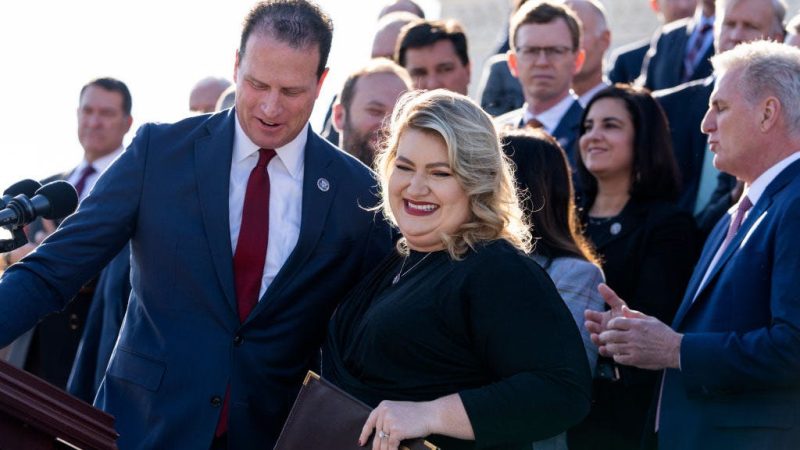EXCLUSIVE – Over 130 House Republicans are set to introduce legislation to rein in federal regulations that cost taxpayers trillions of dollars every year and are the ‘silent killer’ of the American dream.
The Regulations from the Executive in Need of Scrutiny Act, or the REINS Act, is a bill that Republicans have pushed for years, and one they will try again to pass now that Republicans control the House.
‘When you think about all the challenges that we’re facing as a nation, from our national security concerns to hyperinflation the thing that no one talks about is the regulatory environment,’ Rep. Kat Cammack, R-Fla., told Fox News Digital. ‘And it truly is the silent killer of not just the American dream, but I mean, it is contributing significantly to this hyperinflation.’
Cammack said there are over 1 million ‘unique regulations’ in place from by executive agencies that preside over various industries including farming, fishing, energy and others. Compliance costs and economic impacts cost Americans trillions each year.
‘Whether you are a business owner, or heck, even an employee, you have to abide by certain things that sometimes just don’t make that much sense,’ Cammack said.
‘And it makes you wonder how did this come to be? Well, the real swamp, the real red tape exists because of these bureaucrats in basements all over Washington, D.C,’ said Cammack.
‘And a lot of these regulations don’t seem to make a lot of sense, but they sure are expensive. And that’s what this bill aims to do is rein in those swamp creatures, rein in the bureaucrats, cut the red tape, and really rein in this overreaching, overbearing government that has gotten so out of control and then of course, makes us pay for it,’ she added.
Cammack first introduced the legislation in 2021, but it failed to advance in the chamber. This year’s bill, which will be cosponsored by Republican Whip Tom Emmer, R-Minn., and chair of the judiciary committee Jim Jordan, R-Ohio., would broaden the scope of the Congressional Review Act to require every new ‘major rule’ proposed by federal agencies to be approved by Congress before going into effect.
Specifically, the House and Senate would be required to pass a Joint Resolution in order for a major rule to be approved by Congress.
The bill defines a ‘major rule’ as any federal rule or regulation that may result in an annual effect on the economy of $100 million or more; a major increase in costs or prices for consumers, individual industries, government agencies, or geographic regions; or significant adverse effects on competition, employment, investment, productivity, innovation, or the ability of U.S.-based enterprises to compete with foreign-based enterprises.
One example of a federal rule Cammack said is a burden to taxpayers that her regulation would get closer congressional scrutiny is the Waters of the U.S. rule implemented by the Environmental Protection Agency (EPA). The EPA says the rule, which went into effect in December, is in place to foster compliance with the Clean Water Act – which regulates pollution in U.S. waters.
However, Cammack says the rule is a burdensome overreach, since it says that any area that is ‘seasonably wet’ is a subject to federal jurisdiction.
‘Well, heck, I’m from Florida, the entire state is seasonably wet. My yard is seasonably wet. We get 60 inches of rain a year. So, you know by that definition, my front yard would be subject to federal jurisdiction and navigable waters which means that if I wanted to build something, like a treehouse… a play yard for my niece and nephew, I would have to get permission from the Army Corps of Engineers. That’s absurd,’ she said.
The Foundation for Government Accountability (FGA), a non-profit think tank and proponent of the bill, claims in his first year in office, President Biden finalized regulations adding more than $200 billion in new regulatory costs — more than quadruple the costs added during former President Obama’s first year. Cumulative regulatory costs have continued to climb since 2009, ballooning to $1.1 trillion under the Biden administration, according to FGA.
Since 2009, various iterations of the REINS Act have been discussed in Congress and even cleared some committees, but the REINS Act has yet to become law.
Cammack is hopeful that her bill will receive bipartisan support and even win over some Democrats in the Senate. ‘I think that this is such a big issue that impacts people regardless of whether you’re Republican or Democrat, no matter what industry you’re in, you’re being impacted by these regulations,’ Cammack said.
‘I wouldn’t be surprised one bit to get some Democrat support on this because they recognize that the regulatory environment is an equal opportunity offender,’ she added. ‘It doesn’t matter what box you check… at some point, you are going to get caught up in this regulatory regime that you’re going to end up paying for in multiple different ways.’

